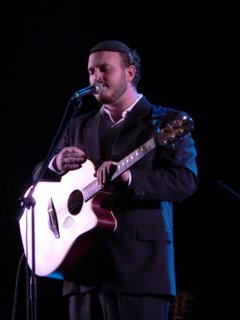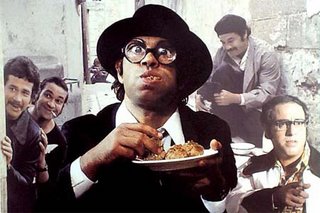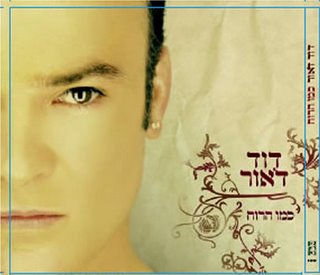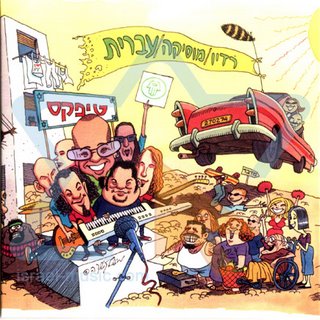
Teapacks Mixes Rap, Mizrachi and Sarcasm on New Album
June 7, 2006 / 11 Sivan 5766
by Benyamin Bresky
Israel National NewsWhile the Kassam rockets are falling, one group of Sderot natives is singing. The band Teapacks, hailing from the besieged development city in the south, has just released its 10th album.
Teapacks continues its light-hearted caricatures of Israeli society. The cover of their new album, Radio Music Hebrew, is a cartoon of the band drawn by well known Israeli cartoonist Michel Kishka. Lead singer Kobi Oz explains the drawing, which is based on the band's lyrics:
"There is a big street party and there is a caricature of us performing. We have some Kassam rockets and we have the Sheehab which is the new Iranian nuclear
rocket flying. And if you can see behind us, there is a kind of suicide terrorist waiting for his chance to blow up. We have the haredim and the students and the new Jamaican style Israelis. We have a lot of types and the album talks about all of them."
One of Teapacks influences is the 1970's Israeli band Kaveret, whose popular Poogy series had fun with Israeli culture. "This is pop music," says Oz. "It's not something of fashion, it's something of folklore. It's like a salute to the music people in Israel listened to forty years ago."
But the Teapacks sound is definitely original. They were one of the first bands in Israeli to incorporate rap in their music. "The artists in Israel are very verbal and they have to say a lot of things so rap is perfect for Israeli music," says Oz. "You can express your opinion in many words. It's not only rap about 'how big is my car,' it's rap about political opinions and telling funny tales. So our kind of rap is like a Jewish rap."
Along with the rap is the Mizrachi style of music Oz grew up with. He personally plays the accordion on many tracks, giving the funky rhythms a kind of kibbutz feel.
Even the band's name is a combination. "I drank a lot of tea when I wrote the songs," Oz explains. But the other meaning of their name is "tipex," which is the Hebrew word for White-Out. "We like to wipe up borders between styles and between people. We are trying to combine something new because we are bored of all the styles."
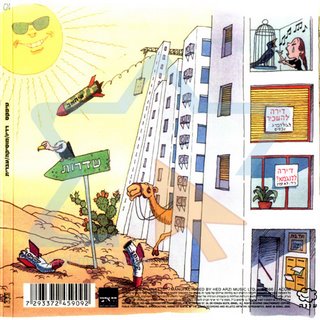
This combination has led to success. Even though the band's quirky lyrics are half the fun, the music can still move people around the world. Their third album sold 3,000 records in Japan. "When we heard about people outside of Israel loving and connecting to this kind of music it made us very happy and very surprised. They like this accordion kind of playing and the artistic album covers."
Last year Oz released a solo album of slow songs and ballads. "It's like a REM scan into my soul. It talks about a hard period of my life, like a sad diary." Although not a Teapacks album, the other members of Teapacks contributed to it. "Teapacks is all about photographing the outside, and this is kind of intimate. It's Kobi Oz and it's like a private peek into my life at that period."
While not particularly religious, the band maintains its Jewishness. The covers of all their albums feature a hamsa, the symbol of a hand often associated with the kabbalah. "The hamsa is the most ancient Jewish symbol. Like the hand that prevented G-d from striking the Jewish houses. So the hamsa is protecting life."
Having recently returned from a series of dates in America and England, the band is now preparing for a tour of Israel in support of their new album. One can expect can expect their sense of humor in the face of Israel's challenges to come through on stage as well. According to Oz, "For us it's like a big outdoor market, with a lot of vegetables and a lot of shouting. It's a fun experience to record and to perform in Israel. This is a funny country."
###
Benyamin Bresky is the host of The Beat on Israel National Radio. He
maintains a music journal at http://www.israelnationalradio.com/israel-beat.htm For more information on Teapacks visit their web site at www.teapacks.com.

